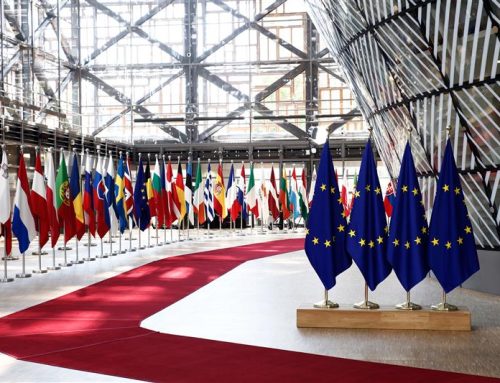Our Take
Russia’s financial tools of malign interference: ASD Co-director Laura Rosenberger testified before the House Foreign Affairs Committee on Tuesday, discussing the holistic nature of Russia’s interference in democratic countries in Europe and North America. Rosenberger highlighted how Russia uses malign finance and economic coercion to both achieve its foreign policy goals and to support other vectors of interference, such as disinformation and cyberattacks.
The lack of financial transparency in foreign capital: ASD Senior Fellow Joshua Kirschenbaum and the Financial Integrity Network’s David Murray write for Bloomberg about the dangers that unchecked and unmonitored foreign capital pose to the United States. The authors argue for greater financial transparency and an end to anonymously owned companies and investments to prevent malign actors from exploiting the opacity of the U.S. financial system to undermine its national security.
Stricter cyber-attack penalties by the EU: In Axios, ASD’s Deputy Director Dave Salvo analyzed the EU’s new framework for punishing perpetrators of cyber-attacks, which specifically aims to impose visa bans, asset freezes, and other sanctions on state and non-state actors that carry out cyber operations against information networks. While the penalties present a more robust response to malign interference, Salvo argues that EU states will need to publicly expose offending state and non-state actors, which some have been reluctant to do in the past.
Big Tech’s role in election security: ASD experts suggested ten questions lawmakers should ask the representatives of Facebook, Google and Twitter, and Federal and state government officials, who testified at Wednesday’s House Committee on Oversight and Reform hearing on “Securing U.S. Election Infrastructure and Protecting Political Discourse.” ASD experts emphasized the importance of public-private partnership in countering foreign-backed disinformation, as well as the necessity of closer collaboration between federal, state, and municipal governments.
Foreign interference in European Parliamentary elections: ASD Research Assistant Étienne Soula argued that recent counter-interference efforts largely center on information operations and cyber-attacks, but recent examples – including the recent scandal involving Austrian Vice-Chancellor Heinz-Christian Strache – illustrate that authoritarian actors are using a range of tools to influence political campaigns and parties. ASD Program Manager Nad’a Kovalcikova was interviewed by the German magazine Bild on the evolving threat to the integrity of the EU’s democratic process posed by foreign interference, arguing for increased coordination among EU member states.
State-control of online media: ASD non-resident fellow Heidi Tworek testified in the Canadian House of Commons before the International Grand Committee on Big Data, Privacy, and Democracy to discuss issues related to regulations of speech on social media. Tworek urged lawmakers to focus on social media business models when countering disinformation rather than specific content. Tworek also wrote a piece for The Atlantic further analyzing social media regulation in comparison to the use of heavy state regulation of media in 1930’s Germany. Tworek argues that even well-intentioned regulatory laws can have unintended outcomes. She calls for regulators to take caution and learn from history in enacting legislation.
The future of election-related interference: ASD co-director Laura Rosenberger was featured on the Future State podcast to discuss ASD’s work on the authoritarian toolkit for malign interference and lies ahead as important elections in both Europe and North America take place in 2019 and 2020. Rosenberger highlighted the tactics used by foreign actors, and how citizens and campaigns will need to protect themselves during the 2020 campaign season. She also discussed the rise of relatively new actors in this space, such as Iran, Saudi Arabia, and other Gulf states.
News and Commentary
U.S. Places Huawei on its “Entity List” in Response to 5G Security Concerns: Two days after U.S. lawmakers expressed concerns that the Chinese government is using telecom giant Huawei as a backdoor to conduct surveillance in countries that use its technology, the Trump administration’s Commerce Department added the company to its “Entity List,” making it virtually impossible for U.S. firms to do business with it. Major U.S. and European tech companies quickly cut ties with Huawei, including Google, which sustains the Android mobile operating system that Huawei’s smartphones use. While this is likely to be a major short-term setback for the Chinese tech giant, some experts have argued that the company may prove more resilient than many expect. Huawei has reportedly been stockpiling American components for a year and also maintains its own chipmaking arm that will help insulate the company from the cutoffs. Huawei also received temporary, limited permission to continue purchasing U.S.-made components in order to maintain existing networks or support existing devices. Still, the decision may deter U.S. allies from integrating Huawei technology into their 5G networks — a move that ASD’s Matt Schrader and Tom Morley have argued would expose those networks to Chinese government interference. (U.S. Senate, Washington Post, Foreign Policy, Axios, ASD)
Congress focuses on election security as 2020 inches closer: Last week, the U.S. House Committee on Oversight and Reform hosted a panel of election officials and representatives from Facebook, Google, and Twitter to discuss the security of U.S. election systems, ongoing efforts by foreign powers to influence public opinion, the response of the government to mitigate these efforts, and the role private sector partners should play in securing U.S. election systems. The hearing came at an important time, as U.S. officials expect interference efforts by foreign adversaries to increase substantially in the run-up to the 2020 presidential race. Facebook’s decision not to remove a doctored video of House Speaker Nancy Pelosi – which had been previously removed from Google-owned YouTube – revealed a lack of consensus and coordination from within the tech community. Meanwhile, despite assurances from election officials, Christy McCormick of the Election Assistance Commission and Bill Galvin, the Secretary of the Commonwealth of Massachusetts, stressed to Congress that several departments responsible for ensuring the integrity of the 2020 election were understaffed and underfunded. Lawmakers have since responded by pledging additional resources to election security efforts. ASD’s David Salvo has argued that Congress should take urgent action to improve coordination between federal, state, and local governments, and to provide state election systems with federal resources and expertise. (U.S. House of Representatives, Politico, Wired, FCW, ASD)
In other news
- With the highest turnout in 25 years, the EU elections resulted in centrist parties failing to reach a majority for the first time.
- The FEC approved an appeal for nonprofit, nonpartisan organizations to offer free cyber security services to all campaigns.
- The FBI, the Department Homeland Security, and Office of the Director of National Intelligence administered joint briefings for candidates on potential cybersecurity and espionage issues for the 2020 election campaigns.
- The Department of Homeland Security warned that Chinese-made drones may be sending sensitive flight data to their manufacturers in China.
- The Trump Administration may ban Hikvision, a Chinese video surveillance company, from purchasing U.S. technology.
- Annegret Kramp-Karrenbauer, head of Germany’s CDU party, faced backlash for proposing regulation of political opinions published online during election campaigns.
- Small telecom companies could be hit hard by a U.S. Government ban on Huawei, possibly leaving some rural Americans without cell service.
Quote of the Week
“The United States faces a multidimensional challenge from Putin’s Russia and its use of asymmetric tools to undermine democracies and weaken transatlantic institutions. Successfully defending against and deterring these activities requires an approach integrated across the U.S. government and coordinated with our allies. It will also require mustering the political will to address the loopholes in our own systems that allow many of these activities to proceed unimpeded. Russia’s undermining of democracy is a matter of bipartisan concern. It is past time for the U.S. government to recognize the serious national security threat posed by the actions of Putin’s Russia, including malign financial influence and economic coercion, and to take the necessary steps to defend the United States and our allies.”
– ASD Director Laura Rosenberger, testifying before the House Committee on Foreign Affairs concerning “Undermining Democracy: Kremlin Tools of Malign Political Influence,” May 21, 2019.
The views expressed in GMF publications and commentary are the views of the author alone.



